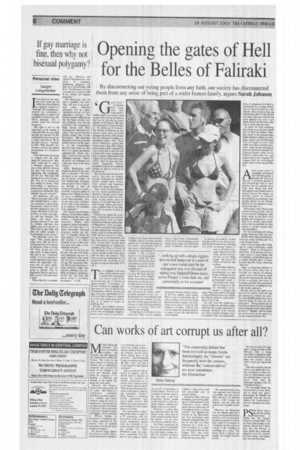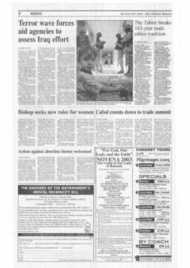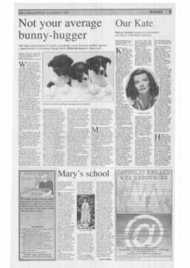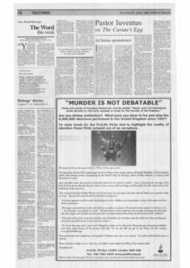Page 6, 29th August 2003
Page 6

Report an error
Noticed an error on this page?If you've noticed an error in this article please click here to report it.
Tags
Share
Related articles
For Or Against Censorship
Why Iba Is Right In Aiming To Keep X Films Off The Small...
The Irish Was Just Censor, Though Rigid,
Sense And Censorship
'very Good' Viewing, Or Was It?
Can works of art corrupt us after all?
Mary Kenny 'The censorship debate has been revived on many fronts. Interestingly, the "liberals" are frequently now the censors, whereas the "conservatives" are now sometimes the libertarians'
Mr Mel Gibson, the Australian film actor, has funded, o-written and directed a new film about the life ofJesus Christ entitled The Passion. The word on the street is that it is startling and brilliant, and so authentically conceived and executed that much of the dialogue is in Latin and Aramaic, Latin being the language of the Romans in Palestine and Aramaic is the semitic language that Jesus spoke. However, Mr Gibson's movie is also controversial, on two counts. Mel Gibson is a conservative, sometimes described as an ultra-conservative, Catholic and liberal Catholics regard his views as anachronistic: they say he has not taken on board the reforms of Vatican U. (He is also noted in the movie industry for being anti-English, and his portrayal of William Wallace in Braveheart is sometimes seen as being responsible for the modern wave of Scottish nationalism, even the devolved Scottish parliament.) The second charge against The Passion is more serious. Jewish groups have said that it is so fiendishly anti-Jewish and so very violent, to boot that it is bound to inflame bus tile feelings towards Jews. Rabbi Eugene Korn of the powerful Anti-Defamation League in America has called the film "toxic" and that it would appeal to "anti-Semites and bigots".
"Jews are uniformly characterised as negative, and the Jewish mob is depicted as forcing the decision [of Christ's crucifixion] on to Pontius Pilate, when in reality it was Pilate's decision alone. There are gross historical inaccuracies and there is massive, and gratuitous, violence." Other leaders of American Jewish communities have voiced similar concern. Mel Gibson may come under pressure to amend or soften certain aspects of the film.
You cannot make a judgement about a film, or a play, or a TV programme, until you have seen it. In all her years of worthy campaigning against what she considered to be screen corruption, that was the one mistake that Mary Whitehouse made: she sometimes condemned what she had not seen, judging merely ground.s of description or printed extracts. That was also a mistake sometimes made in the early years of the Irish Censorship Board: people would denounce a book on a single sentence, without reading the entire text in context. Therefore, I cannot form any judgement about the Mel Gibson movie. since none of us has yet seen it on this side of the Atlantic. I do not know what impact it is likely to have. But what is significant, all the same, is that it is described as having the potential of making a big impact, perhaps in a bad way. Anxieties are raised among Jewish — and some Catholic — critics that it could fuel anti-semitic acts, or prompt violence. Catholic — critics that it could fuel anti-semitic acts, or prompt violence. During the 1960s, following the famous trial over the publication of DH Lawrence's Lady Chatterley's Lover, debate raged over the whole issue of censorship of books or screen material. The argument put forward by the libertarians, and most particularly aired during the Chatterley trial, was that no one had ever been influenced by a book or a movie to behave in a certain way. The popular line was that Genghis Khan had never required a manual to rape and pillage his way across Asia.
The argument used by those who supported some forms of censorship was that books, films and plays did influence actions, could "corrupt and deprave" and did affect the general tone of public morality.
Obviously, the libertarians won the cultural battle and it came to be accepted that books and films were not the deciding factor in a person's actions; there could be no element of "corruption" by the reading of a book or the watching of something on a screen. The phrase "likely to deprave and corrupt" was dropped from the lexicon.
But now, it seems, this argument is being revived, as Mel Gibson's film is being described as a dangerous artistic vehicle which could put bad ideas into people's minds, which in turn may lead to bad acts. (The side complaint, that the movie is not historically accurate, can hardly be taken seriously by a film industry which has misrepresented every historical event from the Normandy landings to the life of Michael Collins.) The censorship debate has been revived on many fronts, and in many new guises. Interestingly, the "liberals" are frequently now the censors, whereas the "conservatives" are now sometimes the libertarians.
PSMr Kevin Myers has told the Sunday Independent in Dublin that "the Catholic Church is a busted flush". It is not from blind loyalty to the Catholic Church that I disbelieve him: but because so many people have made that judgement over the centuries and have always, and repeatedly, been proved wrong.
blog comments powered by Disqus













